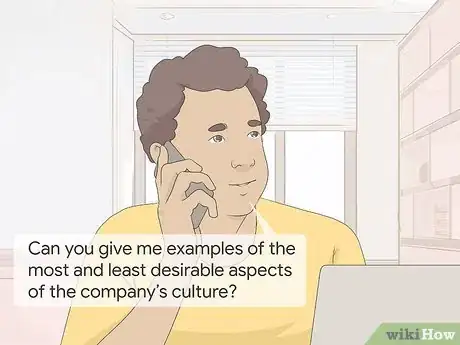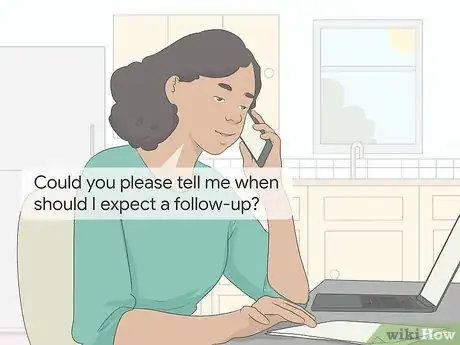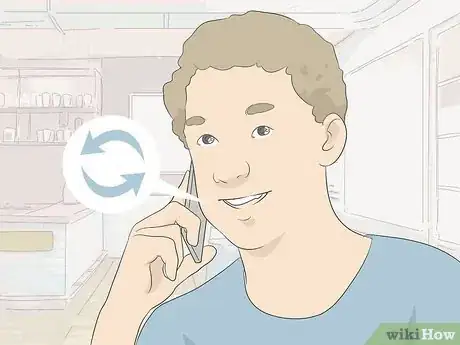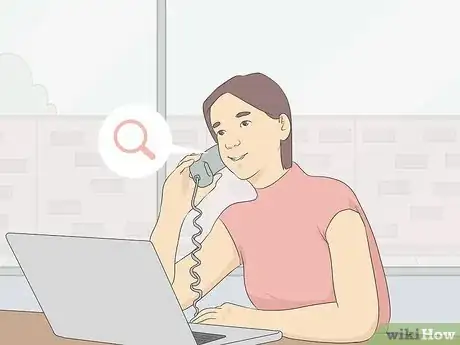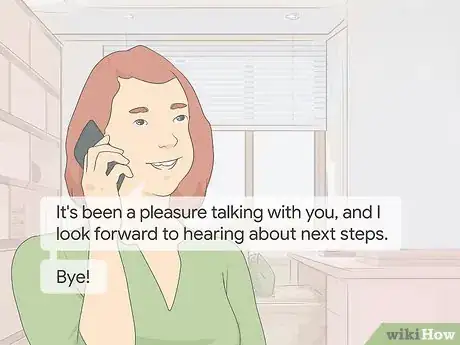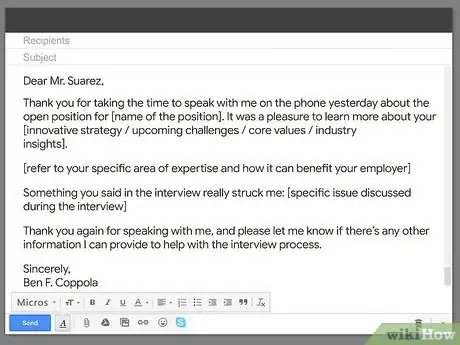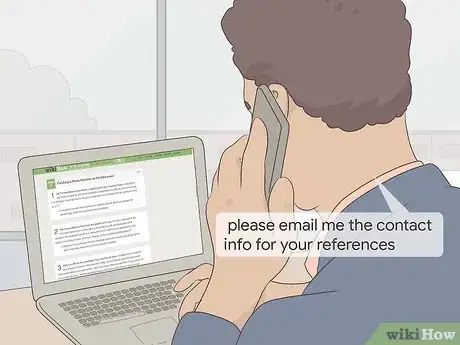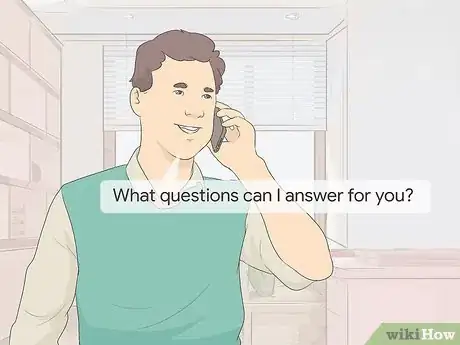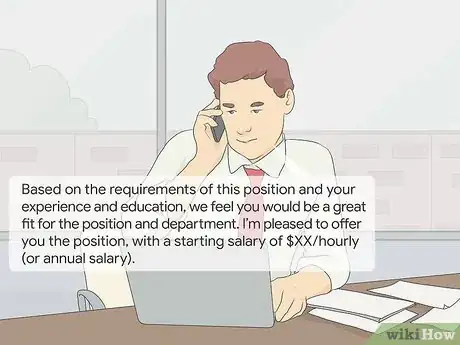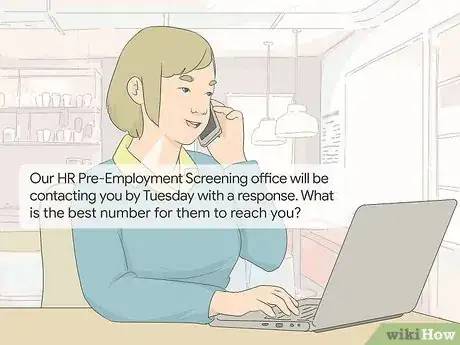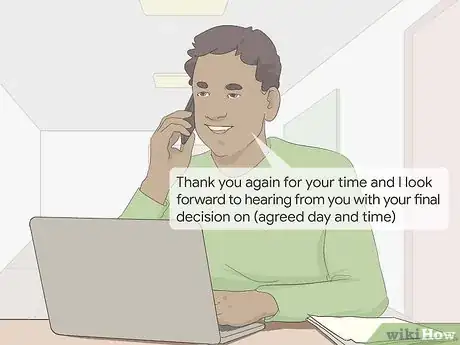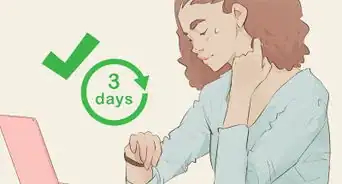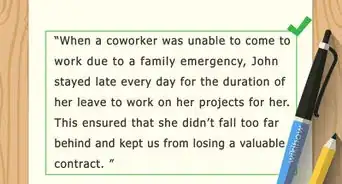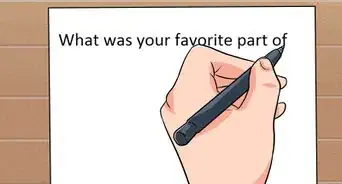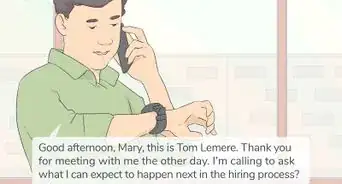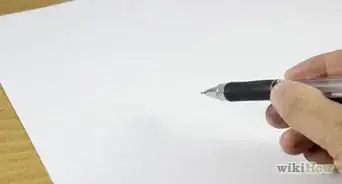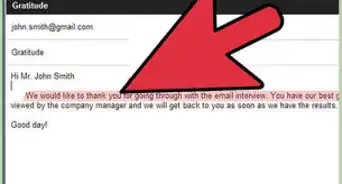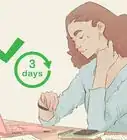This article was co-authored by Kolby Goodman. Kolby Goodman is a Career & Job Search Coach and the Founder of The Job Huntr. With over eight years of experience, he specializes in resume edits, interview preparation, LinkedIn profile feedback, and professional interview coaching. Additionally, his career advice has been featured in publications such as The Huffington Post. Kolby holds a Bachelor’s degree in Economics from San Diego State University.
There are 7 references cited in this article, which can be found at the bottom of the page.
This article has been viewed 15,762 times.
Job interviews of any kind can be awkward and stressful for both parties. Phone interviews, due to the lack of body language and facial expressions, can be even more troublesome. Fortunately, there are some steps you can take to end a phone interview on a positive note, whether you're the candidate or the interviewer.
Steps
Wrapping up a Phone Interview as the Candidate
-
1Take the opportunity to ask your questions when the interviewer inquires. Be prepared to ask the interviewer questions.[1] Research the job and company in advance and write down any questions you think of. During the interview, write down additional questions that pop into your head as the interviewer is speaking. Once prompted, ask 1-3 of your questions, in order of importance.
- Example questions: Can you give me examples of the most and least desirable aspects of the company’s culture? What do you enjoy most about working here? Do you have any concerns about my qualifications for this position?
- Avoid asking about compensation during the first interview.
- Asking good questions will allow a deeper connection with the interviewer, which is a positive. It also allows you to showcase your critical thinking and problem solving skills in relation to the interviewer and the position.[2]
- Try to think about the questions you would have on your first day on the job. What would you want to know? What would you be curious about? What information would you need to gather so that you could do your job better? Ask those questions to show you're in the right mindset for the position.[3]
-
2Ask the interviewer to explain the next steps in the hiring process. Before you end the call, make sure you know exactly when you should expect a follow-up. If the interviewer doesn’t provide this information, ask for it. Also, ask the interviewer if email is the best way to contact them in the future. Write down the information provided so it’s not forgotten.[4]
- Do not follow-up with the interviewer earlier than the time they’ve told you. For example, if they said they’ll contact you in 4 weeks, don’t contact them in 2 weeks asking what’s going on.
Advertisement -
3Reiterate to the interviewer that you’re really excited about the position. End the call by restating how excited you are about the position, especially now that you’ve heard more about it. Also, make sure to mention 1 or 2 skills or experiences you have that would be perfect for the position. Keep this statement to 1 or 2 sentences maximum. Think about what you want to say before the call, or even write down the statement so you don’t get nervous and forget what you wanted to say.[5]
- Be careful that you don’t come across as begging or pleading for the job, just use enthusiasm to express that the job sounds exciting and how happy you’d be to join the team.
- Make sure any skills, competencies, or experiences you mention are related to the job. Alternatively, mention how a skill you have can be transferred to the job successfully.
-
4Review an offer from the interviewer if they make one. If the interviewer offers you the position right away on the phone, avoid jumping in right away and accepting the job. Ask some follow-up questions to ensure you know all the important details of the job. For example, ask what the compensation is, when they’d want you to start, where you’ll be located, who your supervisor will be, and any other important questions that come to mind. Tell the interview you need a little bit of time to consider the offer and provide them with a timeframe when you’ll call or email a response.[6]
- Alternatively, if you know you want the position, accept the job immediately.
- Don’t be afraid to tell the interviewer you need time to think about the offer. If you accept too quickly, you may not get the chance to negotiate some aspects of the offer.
- If you do need time to think about the offer, give the interviewer a specific time frame when you’ll let them know your answer. Then, follow-up within that time frame.
-
5Leave a good impression by ending the phone call professionally. Avoid rambling on about the job or how much you want it. Keep your last few sentences quick, concise, and professional.[7] Wait for the interviewer to say goodbye, then respond in kind and hang up the phone. Don’t wait to hear if the interviewer has hung up the phone.[8]
- Remember that the last thing you say on the phone may be the thing the interviewer remembers most.
-
6Thank the interviewer within 24 hours of the phone interview.[9] Start by sending the interviewer an email thanking them for the opportunity and reiterating your excitement about the position. Include any additional questions you may have thought of in the email, but no more than 2. Send a card instead of an email, if the card will arrive quickly. Alternative, send a card in addition to an email if it will take the card a little while to arrive.[10]
- Don’t send your card via an internal company mail system unless the interviewer works for the same company.
Finishing a Phone Interview as the Interviewer
-
1Let the candidate know if there is anything else you need from them. Explicitly list any items or tasks for which the candidate is responsible for after the phone interview. For example, they may need to fill out a specific form, send contact info for references, and so on.[11]
- Feel free to provide this information in a generic format, where you explain the typical steps in the hiring process of your company.
-
2Ask the candidate if they have any questions for you. End your main part of the interview (where you’ve been asking the questions) with an inquiry as to what questions the candidate has for you. Be sure to do this after you’ve explained the next steps in the hiring process, otherwise, that will be the candidate’s first question.
- Make sure you schedule time for candidate questions into your overall plan for the phone interview. Assume you’ll need at least 5 minutes.
-
3Make an offer to the candidate if you want to hire them. Verbally tell the candidate you thought the phone interview went really well and that you were impressed with their qualifications and experiences. Offer them the position and ask them if they need time to consider the offer. Tell the candidate that you’ll follow-up the interview with an email outlining all the details of the job offer.[12]
- If the candidate requires some time to think about the offer, schedule a specific time to follow-up with them on the phone.
- Send the follow-up email immediately. Include details such as the compensation, start date, office location, supervisor, etc.
-
4Let the candidate know when they will hear back if you don't make an offer.[13] If you're not ready to make a decision or need to review some of the candidate's paperwork, tell them when they can expect to find out if they'll be hired. Clearly indicate the earliest time the candidate can expect to hear from you. If you’re uncertain, add a week or so to your estimate in case you get behind schedule.[14]
-
5End the phone call by thanking the candidate for their time. Once you’ve answered the candidate’s question, take the time to thank them for speaking to you. Also, reiterate (briefly) the next steps, especially the timeframe in which you’ll get back to the candidate. Avoid rushing the end of the interview and sounding eager for it to end. Once you’ve wrapped up, say goodbye. Wait for the candidate to respond in kind and hang up the phone.[15]
- Immediately after you hang up the phone, update your notes to include your thoughts and impressions about the candidate so you don’t forget any of them.
- If you don't feel the candidate is a match, but you're able to give a little bit of feedback so they can improve in the future, do it! Just because that person isn't a good fit today, doesn't mean they can't be a good fit in the future, and you should treat every interaction as if this is a long term relationship.[16]
Expert Q&A
-
QuestionHow do you politely end an informational phone interview?
 Kolby GoodmanKolby Goodman is a Career & Job Search Coach and the Founder of The Job Huntr. With over eight years of experience, he specializes in resume edits, interview preparation, LinkedIn profile feedback, and professional interview coaching. Additionally, his career advice has been featured in publications such as The Huffington Post. Kolby holds a Bachelor’s degree in Economics from San Diego State University.
Kolby GoodmanKolby Goodman is a Career & Job Search Coach and the Founder of The Job Huntr. With over eight years of experience, he specializes in resume edits, interview preparation, LinkedIn profile feedback, and professional interview coaching. Additionally, his career advice has been featured in publications such as The Huffington Post. Kolby holds a Bachelor’s degree in Economics from San Diego State University.
Career & Job Search Coach Keep it short and always cut it off before the time that you've asked from that person. It shows respect, and it gives the other person more motivation to help you further since they know you're not going to take up a ton of their time or abuse their energies. Once the interview is done, be sure to send a thank you follow-up message within a couple of days and pinpoint a couple of major takeaways you've had.
Keep it short and always cut it off before the time that you've asked from that person. It shows respect, and it gives the other person more motivation to help you further since they know you're not going to take up a ton of their time or abuse their energies. Once the interview is done, be sure to send a thank you follow-up message within a couple of days and pinpoint a couple of major takeaways you've had. -
QuestionWhy should you ask questions at the end of an interview?
 Kolby GoodmanKolby Goodman is a Career & Job Search Coach and the Founder of The Job Huntr. With over eight years of experience, he specializes in resume edits, interview preparation, LinkedIn profile feedback, and professional interview coaching. Additionally, his career advice has been featured in publications such as The Huffington Post. Kolby holds a Bachelor’s degree in Economics from San Diego State University.
Kolby GoodmanKolby Goodman is a Career & Job Search Coach and the Founder of The Job Huntr. With over eight years of experience, he specializes in resume edits, interview preparation, LinkedIn profile feedback, and professional interview coaching. Additionally, his career advice has been featured in publications such as The Huffington Post. Kolby holds a Bachelor’s degree in Economics from San Diego State University.
Career & Job Search Coach Interviewers aren't looking for employees who will be cogs in a machine—they're looking for problem solvers, experts, and people who can attack and resolve the biggest pain points and issues that they're facing currently. Asking good questions helps you showcase your ability to critically think and be a valuable asset rather than a simple cog.
Interviewers aren't looking for employees who will be cogs in a machine—they're looking for problem solvers, experts, and people who can attack and resolve the biggest pain points and issues that they're facing currently. Asking good questions helps you showcase your ability to critically think and be a valuable asset rather than a simple cog.
References
- ↑ Kolby Goodman. Career & Job Search Coach. Expert Interview. 28 June 2022.
- ↑ Kolby Goodman. Career & Job Search Coach. Expert Interview. 28 June 2022.
- ↑ Kolby Goodman. Career & Job Search Coach. Expert Interview. 28 June 2022.
- ↑ https://www.inc.com/jeff-haden/how-to-get-hired-the-perfect-job-interview-in-16-steps.html
- ↑ https://www.coburgbanks.co.uk/blog/candidate-tips/closing-an-interview/
- ↑ https://www.inc.com/jeff-haden/how-to-make-the-perfect-job-offer-9-tips.html
- ↑ Kolby Goodman. Career & Job Search Coach. Expert Interview. 28 June 2022.
- ↑ https://www.forbes.com/sites/deborahljacobs/2014/05/27/how-to-ace-a-phone-interview/
- ↑ Kolby Goodman. Career & Job Search Coach. Expert Interview. 28 June 2022.
- ↑ https://money.usnews.com/money/blogs/outside-voices-careers/2011/06/14/17-tips-to-ace-your-next-phone-interview
- ↑ https://www.inc.com/jeff-haden/how-to-get-hired-the-perfect-job-interview-in-16-steps.html
- ↑ https://www.inc.com/jeff-haden/how-to-make-the-perfect-job-offer-9-tips.html
- ↑ Kolby Goodman. Career & Job Search Coach. Expert Interview. 28 June 2022.
- ↑ https://www.inc.com/jeff-haden/how-to-get-hired-the-perfect-job-interview-in-16-steps.html
- ↑ https://business.linkedin.com/talent-solutions/blog/recruiting-tips/2018/4-email-templates-for-every-recruiter
- ↑ Kolby Goodman. Career & Job Search Coach. Expert Interview. 28 June 2022.
